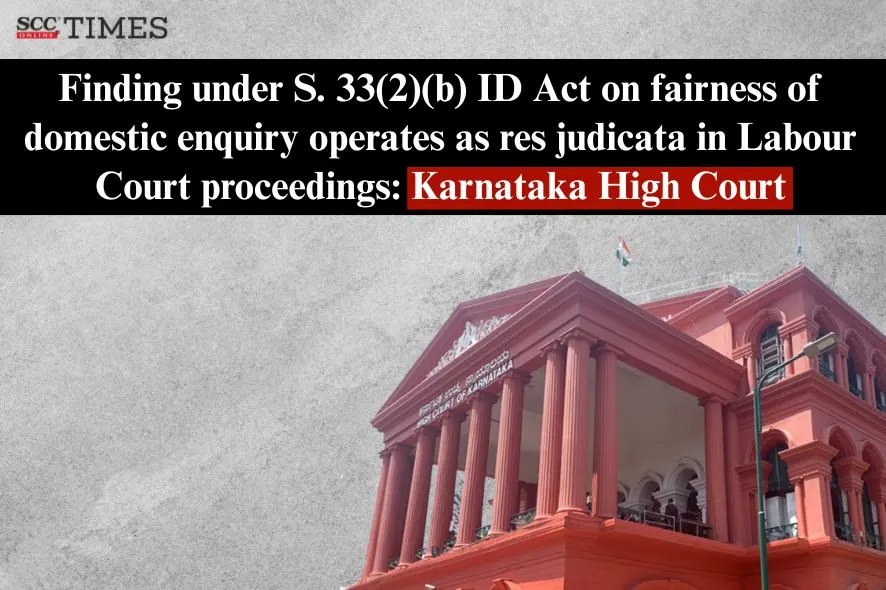Karnataka High Court: In a petition filed under Article 226 and 227 of the Constitution to quash and set aside the order passed by 1st Additional Labour Court, Bengaluru (‘Labour Court’), a Single Judge Bench of Senthilkumar Ramamoorthy, J. while dismissing the petition remitted the matter to Labour Court to consider the challenge to the merits of the finding of the disciplinary enquiry as well as the penalty imposed. The Court stated that if, after recording evidence, the authority under Section 33(2)(b) of the Industrial Disputes Act, 1947 (‘Authority’) concludes that the domestic enquiry was fair and proper, the finding would be binding on the parties and it cannot be re-agitated in any subsequent industrial dispute, as it operates as res judicata.
Background
In the present case, three members of the petitioner-Union were dismissed from their services. The Management invoking Section 33(2)(b) of the 1947 Act, had sought approval for a penalty of dismissal. The Labour Court, on appreciation of evidence led before it by both sides, held that the domestic enquiry was fair and proper and consequently, accorded approval for dismissal.
The petitioner later raised a dispute challenging the penalty of dismissal. The Labour Court declined to reconsider the said issue, holding that it operated as res judicata. Hence, the present petition was filed by the petitioner before the Court.
The question before the Court was if an Authority concludes that the enquiry was fair and proper, would the finding be binding on the parties and operate as Res judicata.
Case Analysis and Decision
The Court relied on Lord Krishna Textile Mills v. Workmen, 1960 SCC OnLine SC 93, wherein it was held thatbefore embarking on the question as to whether the further requirements of Section 33(2)(b) of the 1947 Act are compiled or not, the Authority has to consider the question whether the domestic enquiry is fair and proper. Thus, the Court stated that to consider the compliance of Section 33(2)(b) of 1947 Act, the Authority under Section 33(2)(b) should also satisfy itself that the domestic enquiry is fair and proper.
The Court opined that the question “whether domestic enquiry was fair and proper?” if raised in an application under Section 33(2)(b) of the 1947 Act, and if the finding on such an application is recorded after full-fledged enquiry, such finding is not just a prima facie finding. Further, the Court stated that the as adjudicating authority has the jurisdiction to adjudicate on the fairness of the domestic enquiry and said finding cannot be re-agitated in subsequent industrial dispute, it operates as res judicata between the same parties in a subsequent proceeding.
The Court referred to Lakshmi Devi Sugar Mills v. Ram Sarup, 1956 SCC OnLine SC 39, and stated that while exercising jurisdiction under Section 22 of the Industrial Disputes (Appellate Tribunal Act), 1950 which is similar to Section 33 of 1947 Act when it comes to the nature of enquiry, the Authority had to consider whether the domestic enquiry was fair and proper and then, has to proceed to decide as to whether approval sought is to be granted or not by considering other requirements. Thus, the Court concluded that the enquiry under Section 33(2)(b) of the 1947 Act, as to whether the domestic enquiry was fair and proper, is adjudicatory.
The Court further stated that the Authority under Section 33(2)(b) of 1947 Act cannot adjudicate on the merits of the finding in the domestic enquiry or on the penalty, as it has no jurisdiction to adjudicate on the merits of the findings in a domestic enquiry. Those questions must be adjudicated in a subsequent industrial dispute, if raised.
Thus, the Court dismissed the etition and remitted the matter to the Labour Court to consider the challenge to the merits of the finding of the disciplinary enquiry as well as the penalty imposed.
[Fouress Engineering Karmika Sangha v. Management of Fouress Engg (I) (P) Ltd., WP No. 31178 of 2019 (L-RES), decided on 8-7-2025]
*Order by- Justice Anant Ramanath Hedge
Advocates who appeared in this case :
For the Petitioner: K S Subrahmanya, Advocate.
For the Respondents: Somashekar, Advocate.








